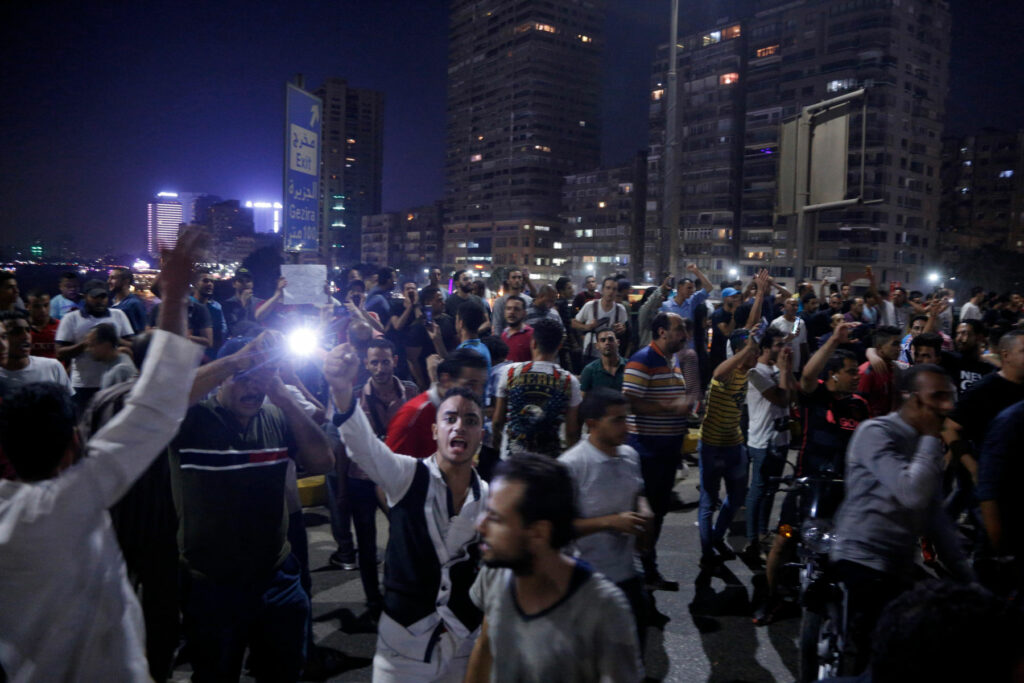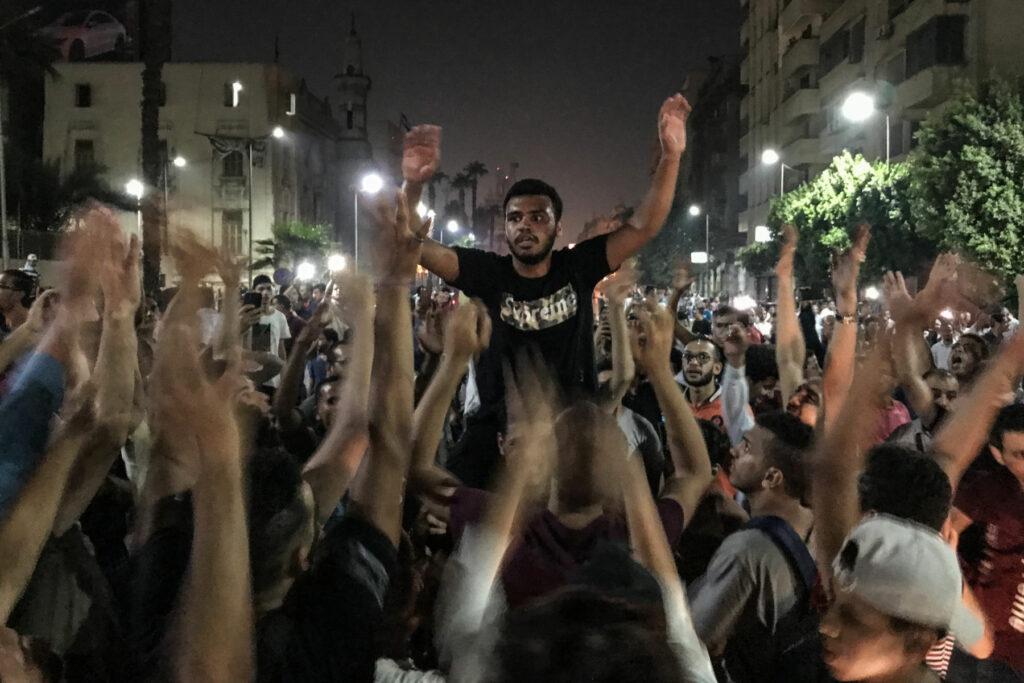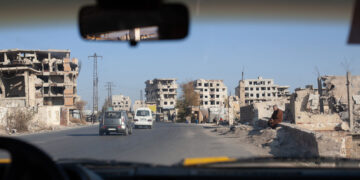Muhammad Kamal is a former research assistant at DAWN, where he worked on human rights protections in Egypt and across the region.
Sara Abdelnasser was one of hundreds of young Egyptians who took to the streets of Cairo and other cities across the country in September 2019 to demand the resignation of President Abdel Fattah al-Sisi. The rare protests against Sisi's regime followed calls for mass demonstrations by a former contractor for the Egyptian military living in self-imposed exile in Spain, whose videos accusing Sisi and his inner circle, including the army, of widespread corruption had gone viral online.
Abdelnasser was arrested along with hundreds of other protesters and charged with demonstrating without permission and joining a terrorist group—the most common charges that Egyptian authorities wield against any activists and protesters. She was released more than two months later. During her detention, she was subjected to abuse by Egyptian security forces, who she said threatened to kill her. One of her interrogators, she recalled, said "that he would kill me and bury my dead body in the desert and no one would know about it." Abdelnasser said she witnessed security forces beating and torturing other peaceful protesters.
The mother of three young children, Abdelnasser escaped Egypt in February of this year, after learning that the Egyptian National Security Agency had arrested her brother-in-law and fearing that her husband would be arrested again. She and her young family eventually reached Turkey, where this interview was conducted.
Abdelnasser recounts her experience of being detained and interrogated in Egypt nearly four years ago. She gives voice to the experience of so many other Egyptian detainees, whose suffering was highlighted by Ayman Nour, the exiled Egyptian opposition leader and former presidential candidate, in an exclusive interview with Democracy in Exile published this week. "Some people are arrested, but we do not know why they are arrested and why they are released or why they are not released," Nour said of the scale of Sisi's repression, from his own exile in Istanbul. "Egypt's problem now is cruelty."
The following transcript has been edited lightly for clarity and length.
"I started participating in public affairs when I got divorced with three children and couldn't provide them with the kind of life they deserved and needed. I realized that Sisi did nothing to improve our lives; instead, he made things worse."
- Sara Abdelnasser
When did you start being interested in public affairs in Egypt? Did you participate in the January 2011 revolution?
I didn't participate in the 2011 revolution in Egypt. I hoped to, but my father refused to let me, although he took part in it from the first moment. He was afraid that I might be arrested or killed.
I started participating in public affairs when I got divorced with three children and couldn't provide them with the kind of life they deserved and needed. I realized that Sisi did nothing to improve our lives; instead, he made things worse. So when I heard Mohamed Ali [the Egyptian businessman in exile in Spain] calling on Egyptians to demonstrate, I went to Tahrir Square to express my objection to Sisi's policies that made Egyptians poorer.
What kind of activities did you participate in, and have you ever joined any political group in Egypt?
Before the demonstration in which I was arrested, I started surfing the internet to learn about what was going on in Egypt. I am a very ordinary working Egyptian woman who never thought of joining any political group. I was only expressing my opinion as an Egyptian woman who can't feed her children.
Can you describe your arrest?
I was arrested while I was demonstrating in Tahrir Square. When I reached the square, I saw groups of people demonstrating and cheering against Sisi. I started a live Facebook broadcast of the demonstration, when I noticed Egyptian security officers from Unit 777 [a military counterterrorism and special operations unit] and got very frightened. One officer in civilian clothes grabbed me and ordered me to walk with him quietly. He took my mobile phone and started asking me questions about me and why I was at the square.

What happened afterward?
The officer put me in a minibus and stood next to it, talking to another security agent. There were other security agents who started to investigate me in a rude way. One of them came and sat next to me and started to insult me. This other officer asked me why "as a respectful woman" I was outdoors at such a late hour and if my family knew that I was participating in the demonstration. He also asked me if I was married. When I told him that I was divorced, he started to sexually harass me.
He started touching me with his hands and rubbing his feet against mine, since he was sitting next to me. I tried to get away from him. I didn't understand how a police officer could harass a detained woman. It was the first time I had ever been arrested.
There was another officer who came and ordered the officer harassing me to get away from me, and instead he sat next to me. He was very kind and mentioned that his name was Ali. He told me not to get worried and promised to keep me safe. He also told me that he didn't like what was going on in Egypt and he wished he himself could participate in the demonstration, but he couldn't because of his job. He told me that if this demonstration turned into a revolution, he would do what he did in 2011—when he said he refused to take part in arresting, beating or killing demonstrators.
What happened next? How long were you in the minibus, and were there other detainees with you?
Then came another officer who searched my bag. He was angry and asked me if I was filming the demonstration for Al Jazeera. They searched my mobile phone and found my texts in which I wrote that I was going to participate in the demonstration.
I was detained in the minibus from 11 p.m. until 2 a.m. The security officers detained other young people in the minibus and beat up some of them until they were bleeding from different parts of their bodies.
Where did they take you?
They took me to al-Azbakeya police station. A police commander referred to me as "the girl who works for Al Jazeera." He started cursing at me and told a policeman to take me away and tell the other policemen that I work for Al Jazeera. They put me in a special cell called "the fridge" (al-thallaga), a very small cell used to detain activists. It was the size of a storage room. There was an old woman and many male detainees from the demonstration with me.
What happened during your detention? Did the police commit any violations?
They divided us into groups and gave us numbers, saying that from that moment on, we wouldn't hear our names, but would be called by those numbers. They were cursing me. They beat up the male detainees until most of them were bleeding. They then took us in groups to the Central Security building in Shubra al-Kheima, north of Cairo.
"I have completely lost the feeling of being safe. When someone walks behind me, I feel that he is going to arrest me. I am suspicious of all people, and I can't trust anyone. I'm still afraid that someone will say something about me or report me to the authorities."
- Sara Abdelnasser
What happened there?
Security officers gave us food, but I couldn't eat. I was terrified and feeling unwell, because I was on antidepressant medication at the time and they took it away from me. Then an officer came and said, "You are safe here, and I will never allow anyone to harm you." I asked him when we would get released. He said that the number of detainees was very large, and he didn't know. He then told me they would start interrogating me before the others, because I was the only girl.
They then blindfolded me and took me to a room to be interrogated by agents of the National Security Agency. It was the first time in my life that I was blindfolded. I later learned that they blindfolded all detainees when National Security agents interrogated them, because they did not want detainees to identify these agents. Weird things happened on the way to the interrogation room. They took me through many doors and up and down different staircases. It was as if they were walking me in circles.
When I entered the interrogation room, I could hear two different voices of interrogators coming from two different sides of the room. They used different tones. One of them played the good cop role, and the other the bad cop.
Interrogator 1, the bad cop, asked: "Did you participate in the January 2011 revolution?"
I did not, I said, because I was getting married on Jan. 27, 2011, the day before the "Friday of Anger" [the fourth day of the uprising].
Interrogator 1, asked: "Were you interested in Egyptian political affairs?"
"Yes I was," I said, but I did not participate in demonstrations because I was busy preparing for my wedding.
"Did you participate in the events of 2012?" he asked.
"No I did not," I said.
"Did you participate in the 2013 events?"
"No I did not," I said, "because I was pregnant and because my husband left me."
"Why did you get divorced?"
"Because my ex-husband cheated on me," I said.
"Did he cheat on you or you on him?"
"He cheated on me," I said.
"What were the circumstances, and how did he cheat on you?"
These questions started to offend me, but I told him that one day I found my ex-husband in bed with my friend.
"And does that call for divorce?" he replied. "The people of Ayn Shams [the neighborhood where Abdelnasser lived] are known for extramarital affairs."
"Did you join the Muslim Brotherhood?"
"Of course not," I replied. My appearance shows that I don't belong to the Muslim Brotherhood. I wasn't veiled and was wearing modern clothes.
"Are you a member of the April 6 Movement?"
"I am not," I said. When I denied it, one of the interrogators started threatening me in anger and offending me with profanity, saying that he would kill me and bury my dead body in the desert and no one would know about it. I was terrified and started crying.
Then the second interrogator, the one playing the good cop, intervened: "You are a mother, and a respected lady closes the door to her house and takes care of her children at times like these," he said. "She doesn't participate at all in these events."
They ended the interrogation there, and while I was going out of the interrogation room, I heard one of the officers ordering a soldier to make all the male detainees take off all their clothes, blindfold them and bring them to the room.

What happened after that interrogation?
They took us to the Supreme State Security Prosecution (SSSP) headquarters, where I was held in a cell with other female detainees. They divided all detainees into groups because there were thousands of us. There were also human rights lawyers who were helping us.
The prosecutor who investigated me was a tax evasion prosecutor. I learned later that prosecutors from many different legal backgrounds were brought in to carry out the investigations because of the large number of detainees.
The prosecutor who interrogated me was so sympathetic to me that I thought he would decide to release me, but then I learned that they had been instructed to lock up all those who had been arrested until the higher authorities decided what to do with them. The interrogation lasted an hour at dawn.
What happened after the SSSP hearing?
They sent me and the other female detainees to al-Qanater women's prison. The first person I saw in al-Qanater was the famous Egyptian lawyer and human rights defender, Mahienour El Masry, who calmed us down. [Masry was there to represent detainees]. But then she was arrested herself [days later].
The wardress started to search me and ordered me to take off all my clothes. She gave us women's jilbab, which is called al-shall and is very thin and does not cover the body fully. She gave each of us two jilbabs to cover our bodies. They put us in the reception ward, where female detainees are held until moved to permanent prison cells. The reception ward was very small. It had a small bathroom and only nine beds, and there were 62 of us in there at the time.
What was your detention like at al-Qanater? How long did they keep you there, and what were the prison conditions?
I was kept at the reception ward for 13 days. The wardress told us that it was the first time that she had seen such a large number of female political detainees. They had to empty a prison ward so that they could use it to hold us.
At first, I sat alone because the wardress put me with criminal detainees, not political ones. They also put Mahienour alone in an isolated cell so that she wouldn't communicate with us. When I started to cry because I couldn't talk with anyone, the wardress moved me to Mahienour's prison cell but ordered us not to talk to each other.
At the beginning, they gave every three women a small packet of cheese with two tomatoes. Later they gave us some cooked eggplant.
When did you threaten to go on a hunger strike?
I told the prison administration that I would start a hunger strike because my family didn't know where I was, the prison didn't allow food or clothes to enter, and we didn't know the dates of our next hearing at the SSSP.
The ward guard said that a hunger strike is not allowed in the prison and that they can torture us and forcibly feed us if we started a hunger strike. I asked to meet the head of the investigations in the prison, who told me to stay quiet and not make any trouble. He said that I should get rid of any revolutionary ideas and added that if I behaved, he would let me have papers and pens.
I knew that they carried out "virginity tests" for other female detainees, but they didn't do such tests for us. Instead, they carried out pregnancy tests for all the female detainees, including women who were virgins and unmarried.
Then, one day, they moved us to Ward 8 and divided us into three groups. Two of the groups were made of political detainees, whereas the third was criminal detainees. In Ward 8, they would give us a bucket of beans or lentils every morning for the whole day. The beans were not edible for humans. Once a week, they gave us meals that contained meat. But the meat's color was either black or blue. We used to pour hot water on it to be able to eat it.
I stayed in al-Qanater for two months. The SSSP decided to release me after the lawyer provided them with all my details and told them that I was a mother of three children.
How did you feel when you were released?
I couldn't believe it. I thought I wouldn't be released, but I was happy. I couldn't describe how happy I was to see my three children. But I have completely lost the feeling of being safe. To this day, I have problems communicating with people. When someone walks behind me, I feel that he is going to arrest me. I am suspicious of all people, and I can't trust anyone. I'm still afraid that someone will say something about me or report me to the authorities.





































